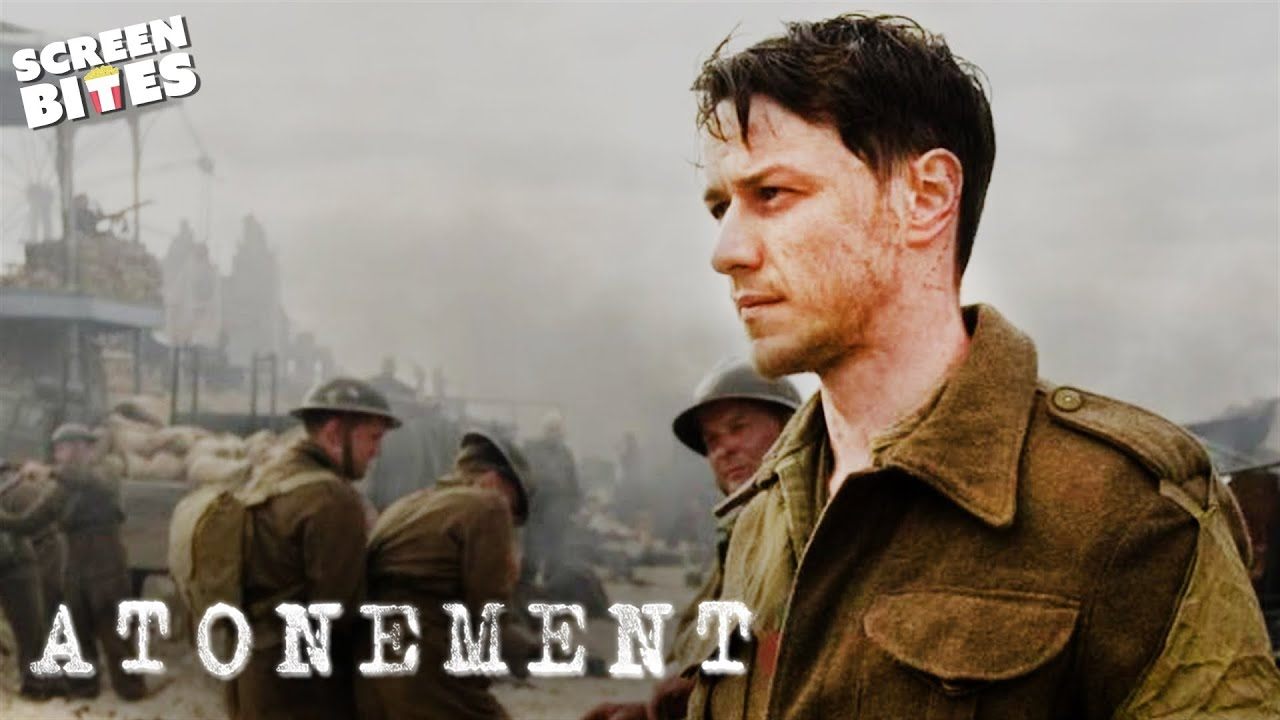Atonement (2007)

“Atonement,” directed by Joe Wright and based on Ian McEwan’s novel, is a cinematic tour de force that intricately weaves together themes of love, guilt, and the consequences of betrayal. Released in 2007, the film captivates audiences with its sweeping narrative, stunning visuals, and powerful performances, earning critical acclaim and several Academy Award nominations.

Set against the backdrop of pre-World War II England and spanning several decades, “Atonement” unfolds as a haunting tale of mistaken accusations and shattered lives. At its heart is the story of Briony Tallis (played by Saoirse Ronan as a child and Romola Garai as an adult), a young aspiring writer whose misguided actions irrevocably alter the lives of those around her.
The narrative begins on a sweltering summer day in 1935 at the Tallis family estate. Briony, a precocious thirteen-year-old with a fervent imagination, misinterprets a series of events involving her older sister Cecilia (portrayed by Keira Knightley) and Robbie Turner (played by James McAvoy), the son of the family’s housekeeper. This misunderstanding leads to a tragic accusation that tears apart Cecilia and Robbie’s budding romance and sets off a chain of events with far-reaching consequences.

Central to the film’s exploration is the theme of innocence lost and the repercussions of one’s actions. Briony’s false accusation not only devastates the lives of Cecilia and Robbie but also alters the course of their futures. As World War II unfolds, Robbie is unjustly imprisoned, while Cecilia volunteers as a nurse, both grappling with the wreckage of their shattered dreams and the enduring pain of separation.
The film’s narrative structure is noteworthy for its non-linear approach, shifting between different timelines and perspectives to reveal the full scope of Briony’s guilt and its lasting impact. As Briony grows older and seeks redemption through her writing, the film examines the boundaries between truth and fiction, memory and imagination, and the elusive nature of absolution.
Visually, “Atonement” is a feast for the eyes, with Joe Wright’s direction infusing each scene with emotional depth and visual symbolism. From the lush green landscapes of the Tallis estate to the stark realities of war-torn France, the cinematography enhances the film’s thematic exploration of beauty and brutality, love and loss.
The performances in “Atonement” are nothing short of extraordinary. Saoirse Ronan delivers a breakout performance as the young Briony, capturing the character’s innocence and later remorse with poignant authenticity. Keira Knightley portrays Cecilia with a blend of vulnerability and defiance, while James McAvoy imbues Robbie with a quiet strength and resilience that make his plight all the more poignant.

The film’s score, composed by Dario Marianelli, further enhances its emotional resonance, with its haunting melodies and evocative themes underscoring the characters’ inner turmoil and the passage of time.
At its core, “Atonement” is a meditation on the power of art to confront and reconcile with the past. Through Briony’s evolving perspective and her attempt to rewrite history through her writing, the film explores themes of guilt, forgiveness, and the elusive nature of truth. Ultimately, “Atonement” challenges viewers to confront the consequences of their actions and the complexity of human relationships in a world overshadowed by war and loss.

In conclusion, “Atonement” stands as a cinematic achievement that transcends its period drama trappings, offering a profound and deeply affecting exploration of love, betrayal, and the quest for redemption. Through its exquisite craftsmanship, powerful performances, and poignant storytelling, the film continues to resonate with audiences, reminding us of the enduring power of forgiveness and the unyielding passage of time.
As a timeless tale of love and loss, “Atonement” remains a testament to the transformative impact of cinema and the enduring allure of stories that linger in the heart long after the credits roll.
![US] Atonement (2007): Fledgling Writer Briony Tallis, As A , 58% OFF](https://static.ffx.io/images/$zoom_1%2C$multiply_0.4006%2C$ratio_1.777778%2C$width_1997%2C$x_0%2C$y_204/t_crop_custom/q_86%2Cf_auto/ade5b1775c9c5ea9508440c363ca9181682af631)











